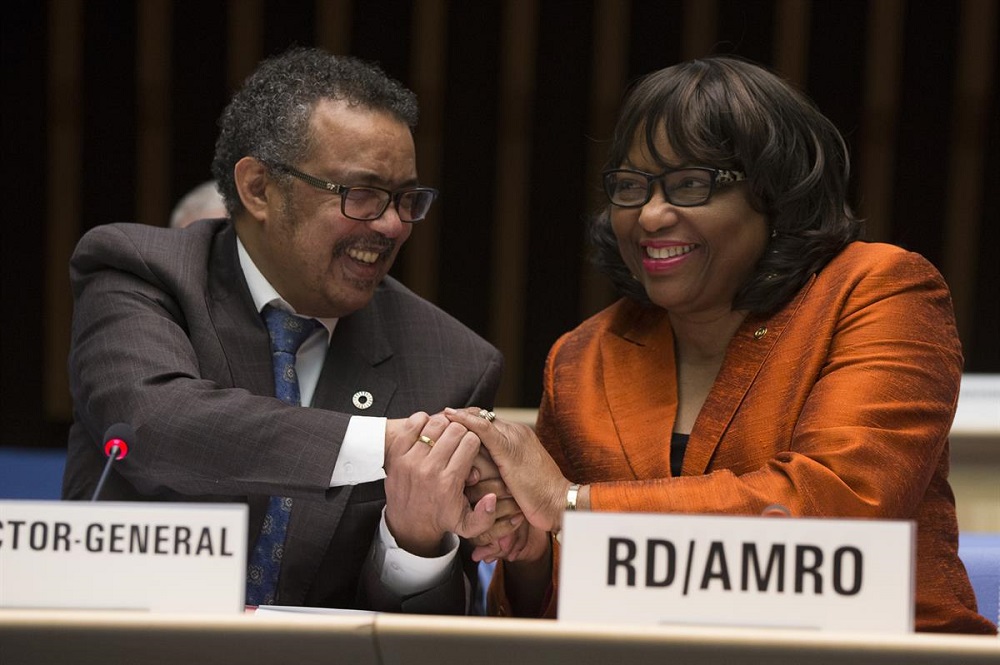December 5, 2023 – It is with great sorrow that the Pan American Health Organization (PAHO) informs of the passing of Director Emeritus Dr. Carissa F. Etienne.
Dr. Carissa F. Etienne, a native of Dominica, served as Director of PAHO and World Health Organization (WHO) Regional Director for the Americas from February 2013 to January 2023.
“Carissa was a dear friend and colleague, and under her steadfast leadership and guidance, PAHO achieved significant milestones for the region of the Americas while facing one of our greatest public health challenges with COVID-19,” PAHO Director Dr. Jarbas Barbosa said. “I am very saddened by her passing, and my thoughts are with her family, friends and all of us at PAHO who cared deeply for her.”
During Dr. Etienne’s tenure, PAHO led the response to the unprecedented COVID-19 pandemic in the region of the Americas, as well as efforts to control Zika and chikungunya epidemics and cholera and yellow fever outbreaks in Haiti and Brazil, while significantly improving the Organization’s response to emergencies and disasters within 48 hours.
Under her leadership, the Americas eliminated the endemic transmission of measles, rubella, and congenital rubella syndrome, and made considerable strides in the prevention and control of non-communicable diseases. Legislative and regulatory mechanisms gained traction, as countries enacted legislation on the labelling of food products and introduced taxes on sugar-sweetened beverages.
Advances were also made in strengthening national health systems and in progress toward universal health. In the last five years of Dr. Etienne’s mandate, deliveries by skilled birth attendants increased from 95% to nearly 100% and, for the first time, the Region of the Americas reached the recommended target of 25 physicians and nurses per 10,000 people.
Prior to becoming PAHO Director, from March 2008 to November 2012, Dr. Etienne served as Assistant Director-General for Health Systems and Services at the World Health Organization (WHO) in Geneva, Switzerland. Before that, she served as Assistant Director of the Pan American Sanitary Bureau from July 2003 to February 2008, where she led five technical areas: Health Systems and Services; Technology, Health Care, and Research; Health Surveillance and Disease Management; Family and Community Health; and Sustainable Development and Environmental Health.
During her tenure at both WHO and PAHO, Dr. Etienne directed efforts to renew and strengthen health systems based on primary health care. She has also spearheaded policies for reducing health inequalities, increasing people-centered care, and integrating health into broader public policies.
“We have lost a great public health champion,” Dr. Barbosa said. “Dr. Etienne’s invaluable experience will be sorely missed in global health discussions to improve the lives of people and to ensure better preparedness for global health emergencies.”
missed in global health discussions to improve the lives of people and to ensure better preparedness for global health emergencies.”
Dr. Etienne began her career in her native Dominica as a medical officer at the Princess Margaret Hospital and was later appointed as the Chief Medical Officer of that country. She has also served in other high-level posts in Dominica, including as Director of Primary Health Care Services, Coordinator of the National AIDS Program, Disaster Coordinator for the Ministry of Health, and Chair of the National Advisory Council for HIV/AIDS.
Dr. Etienne received her medical degree (Bachelor of Medicine and Bachelor of Surgery-MBBS) from the University of the West Indies, Jamaica, and her Master of Science Degree (MSc) in Community Health in Developing Countries from the London School of Hygiene and Tropical Medicine, University of London.


 Caribbean News1 week ago
Caribbean News1 week ago
 Caribbean News7 days ago
Caribbean News7 days ago
 Caribbean News1 week ago
Caribbean News1 week ago
 Caribbean News1 week ago
Caribbean News1 week ago
 Bahamas News7 days ago
Bahamas News7 days ago
 News7 days ago
News7 days ago
 Bahamas News1 week ago
Bahamas News1 week ago
 News7 days ago
News7 days ago












